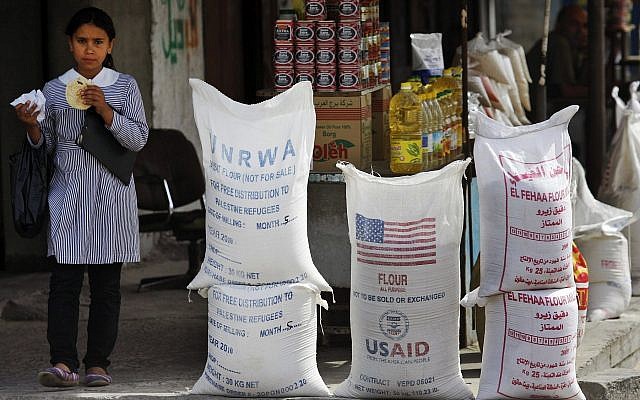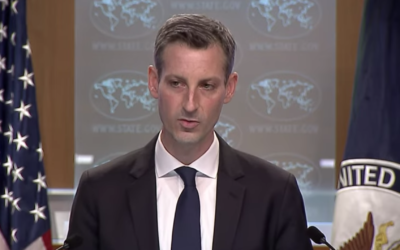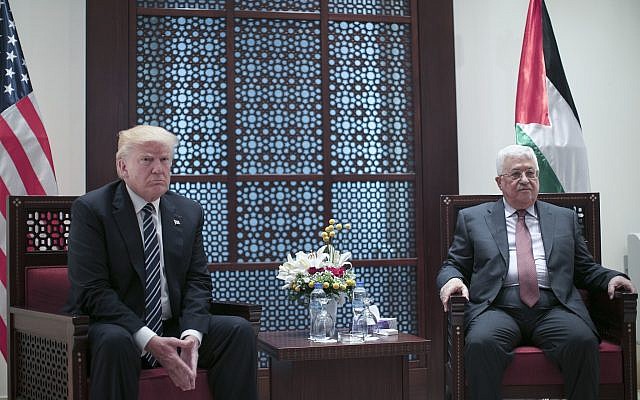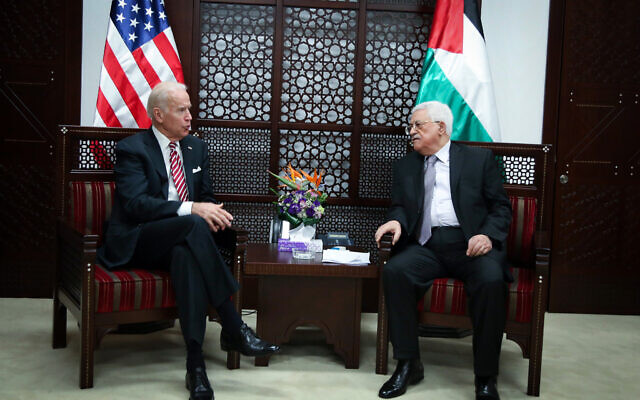State Dept. spokesman says previous administration’s decision to end assistance, after PA refused to engage with peace efforts, didn’t produce political progress or concessions

A US State Department spokesman said Tuesday that the previous administration’s slashing of aid to the Palestinians had failed to produce results and reiterated the new American leadership’s intention to restore such financial assistance.
“The suspension of aid to the Palestinian people has neither produced political progress, nor secured concessions from the Palestinian leadership. It has only harmed innocent Palestinians,” Ned Price said at a press briefing.
“The US will reinvigorate our humanitarian leadership and work to galvanize the international community to meet its humanitarian obligations, including to the Palestinian people. This is something we’re working on very quickly to restore and announced,” Price added.
Before the Trump administration began tightening the screws on the PA in 2018 for refusing to engage with its peace efforts, the United States was the single largest donor country to the Palestinian Authority.
The US paid hundreds of millions of dollars a year to the PA’s creditors, such as the Israeli state utility companies from which the Palestinians purchase water and electricity. They paid for training for the PA’s security forces and numerous infrastructure projects.

Washington also gave hundreds of millions a year in funding for the United Nations Works and Relief Agency — known as UNWRA — which is in charge of administering the daily needs of hundreds of thousands of Palestinian refugees and their descendants across the Middle East.
In 2015 alone, the United States Agency for International Development allocated $557 million for the West Bank and Gaza. By 2020, the total number was closer to $19 million.
Some exceptions remained, such as American funding for the East Jerusalem Hospital Network. In 2020, the United States also provided an additional $5 million in emergency coronavirus relief to the Palestinians.
Meanwhile, international aid to the PA dropped over 60% during 2020, according to publicly available PA financial documents.
Price on Tuesday also referred to a speech given by the Acting US Ambassador to the UN Richard Mills, who said the Biden administration was renewing US relations with the Palestinian leadership, and restoring “credible engagement” with the Palestinians, as it works toward a two-state solution to the Israeli-Palestinian conflict.
“Under the new administration, the policy of the United States will be to support a mutually agreed two-state solution, one in which Israel lives in peace and security alongside a viable Palestinian state,” Richard Mills, the acting US ambassador to the United Nations, told the UN Security Council last week.

In what were the first major public remarks on the Israeli-Palestinian conflict by an official from the Biden administration, Mills specified that Washington will reopen the diplomatic offices serving the Palestinians and restore major aid allocations to the Palestinians, reversing Trump administration policies.
“President Biden has been clear that he intends… to take steps to reopen diplomatic relations that were closed by the last US administration,” Mills said.
Former US president Donald Trump closed the Palestinian Liberation Organization’s diplomatic mission in Washington in 2018, against the backdrop of the Palestinian Authority’s boycott of his administration following the US recognition of Jerusalem as Israel’s capital. In 2019, the Trump administration shuttered the US consulate in Jerusalem, which served as the de-facto embassy to the Palestinians in East Jerusalem, the West Bank and Gaza. The mission was folded into the US embassy to Israel in Jerusalem and the previous position of consulate-general was dissolved.
US President Joe Biden and Vice President Kamala Harris vowed during the campaign to reopen both missions, but they did not specify how they plan on doing so. Reopening the PLO mission in Washington would violate Congressional legislation that ordered its shuttering if the Palestinians filed a suit against Israel at the ICC, which they did in 2017. Reopening the consulate in Jerusalem would require some degree of permission from the Israeli government, which is not expected to back a move that effectively re-designates the West Bank as a separate entity from Israel.
“We do not view these steps as a favor to the Palestinian leadership. US assistance benefits millions of ordinary Palestinians and helps to preserve a stable environment that benefits both Palestinians and Israelis,” Mills said.

“At the same time, I must be clear, the US will maintain its steadfast support for Israel,” the acting ambassador continued. “Under the Biden Administration, the United States will continue its longstanding policy of opposing one-sided resolutions and other actions in international bodies that unfairly single out Israel.”
Mills said the US will urge countries to follow the paths of the United Arab Emirates, Bahrain, Sudan and Morocco, which normalized relations with Israel at the behest of the Trump administration. However, the US diplomat clarified that such agreements are “not a substitute for Israeli-Palestinian peace.”
Marking a return to traditional US policy before Trump, which opposed Israeli expansion in the West Bank, Mills called on the sides to avoid unilateral steps such as settlement building, annexation, and home demolitions by Israel and incitement to violence and payments to security prisoners by the Palestinians.
As reported by The Times of Israel
